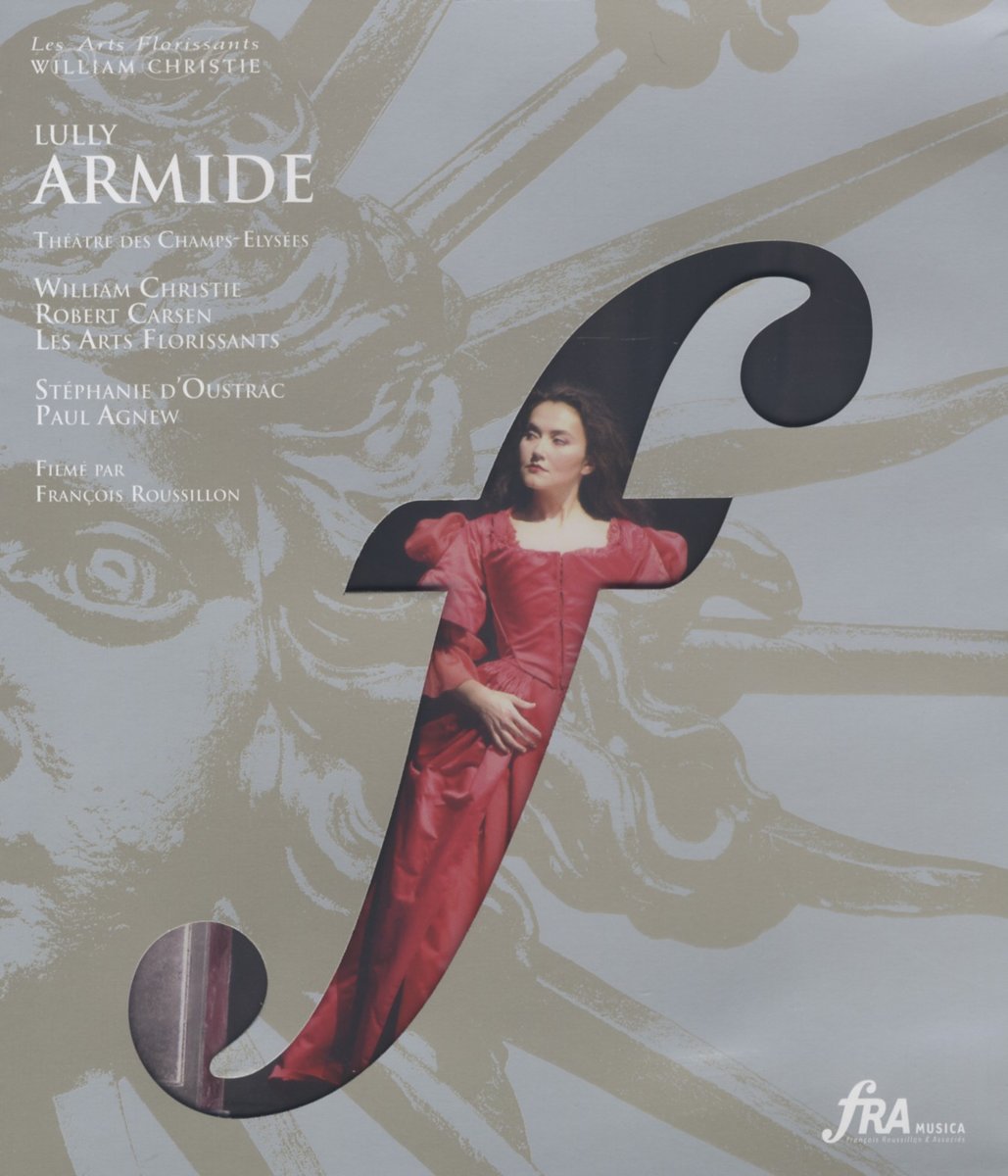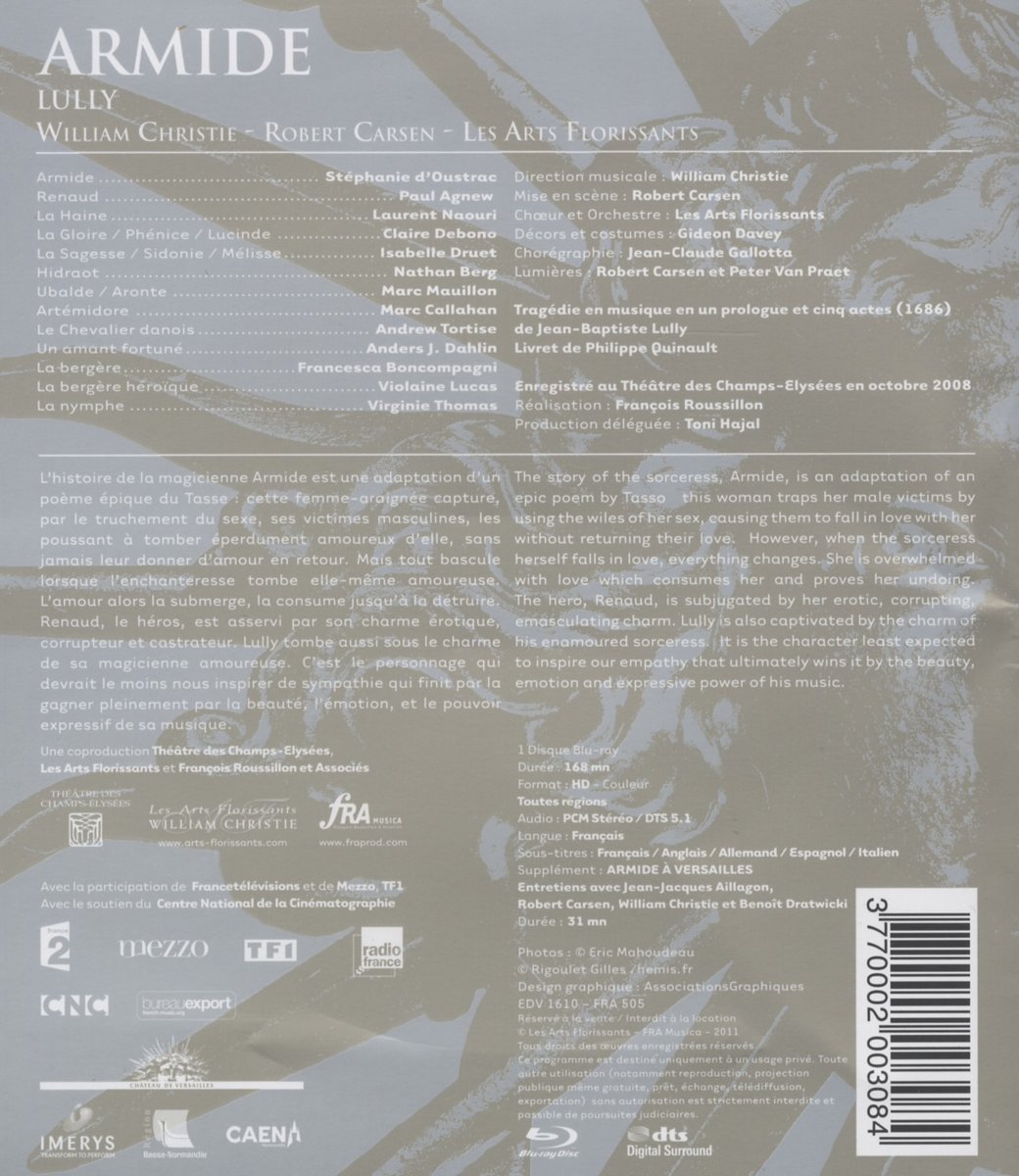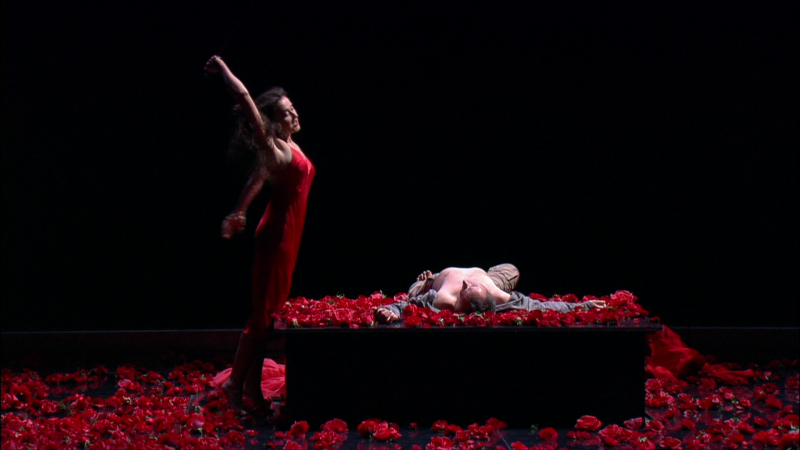

Jean-Baptiste Lully Armide opera to libretto by Philippe Quinault. Directed 2008 by Robert Carsen at the Théâtre des Champs-Élysées. Stars Stéphanie d'Oustrac (Armide), Paul Agnew (Renaud), Claire Debono (Glory, Phénice, and Lucinde), Isabelle Druet (Sagacity, Sidone, and Mélisse), Laurent Naouri (Hatred), Nathan Berg (Hidraot), Marc Mauillon (Ubalde and Aronte), Marc Callahan (Artémidore), Andrew Tortise (a Danish knight), Virginie Thomas (the nymph) and Anders J. Dahlin, Francesca Boncompagni, and Violaine Lucas (other demons in disguise). William Christie conducts the orchestra and choir of Les Arts Florissants. Mise en scène by Robert Carsen; set and costumes by Gideon Davey; choreography by Jean-Claude Gallotta; lighting by Robert Carsen and Peter Van Praet. Directed for TV by François Roussillon; produced by Tony Hajal and David Kulas. There is a bonus extra with excellent discussion of the production by Carsen, Christie and others. Sung in French. Released 2010, disc has 5.1 dts-HD Master Audio sound. Grade: A
The baroque composer Lully is considered the father of French opera. (He literally gave his life to music when he accidentally stabbed his foot beating out time with his long staff, which led to an infection and gangrene.) Lully worked closely with the poet and dramatist Philippe Quinault. Armide, dated 1686, is considered to be their masterpiece. Lully worked during the reign of Louis XIV (the Sun King), which is, of course, also the time and place where today's art of ballet was born.
Armide began with a long (20 minute +) allegorical Prologue praising King Louis XIV. This was considered obligatory even though it was unrelated the the story to follow. Director Carsen explains (in the bonus extra) that this production of Armide is uncut. So Carsen had to come up with a way to make the dry prologue relevant to today's audience. The solution was to turn the prologue into a funny mock lecture on Louis XIV by tour guides at the Versailles museum. Here we see Wisdom (or Sagacity) on the left (Isabelle Druet) and Glory on the right (Claire Debono) making a presentation to tourists with the aid of giant slideshow visuals of art glorifying the Sun King:
Below is another of the images from the slide show. I couldn't resist this chance to show how good a painting can look on HD television. I've been saying for years that fine-art painting and sculpture are natural subjects for HDVDs. (Alas, only two titles have come out, both about Vincent Von Gogh) :
Baroque operas produced during the reign of the Sun King were richly staged with huge casts of characters in fantastic costumes, elaborate ballet numbers, and large choral formations. Carsen can only hint at this with the budget of a contemporary opera house. But he does have 10 professional dancers to deploy and the chorus will do a lot of pageant-style dancing also. The video of our tour guides continues when a group of students from a college dance department (I'm making this up) are led through Versailles. When they get to the Hall of Mirrors, they know what to do:
The students are taking this course for credit, so a professor has to be with them. All those late-night sessions drinking French wine have taken their toll on our poor prof, and he is so sleepy. While the students continue the tour, he finds a cozy place to take a nap, and he starts to dream. This was a brilliant move by Carsen. For now on, his show depicts the prof's dream of the story of Armide, and Carsen can use any design element he can afford:
Oh, yes. This is an opera about Armide. We are now in the time of the Crusades. We are in Damascus, where the King is a magician. Armide (Stéphanie d'Oustrac), the King's beautiful, unmarried niece, is a witch:
Thanks to Armide's sorcery, all but one of the knights who attempted to conquer Damascus have been seduced and taken captive. Only the knight Renaud has been able to resist Armide. This intrigues Armide enormously, who complains of Renaud:
Earlier we met Glory and Sagacity, the tour guides. They are now Phénice and Sidonei, Armide's confidants:
Now we meet the gallant and incorruptible Renaud, who looks a lot like our professor still taking his nap:
Armide sends out legions of demons to ensnare Renaud in a deep sleep:
Now Armide can rid her country of the last threat from the West. But as she tries to strike him with her knife, she falls madly in love with Renaud:
Armide commands the demons of lust and seduction to morph into gentle breezes of true love:
Armide fears she can't win Renard's true love, so with her magic she bewitches him into loving her. You may notice that I've provided a lot of screenshots of Armide. That's because this opera has only one real theme, the psychology of one woman in love. There are many other characters in the show, but they are not developed. For the first 3 of the 5 acts, Stéphanie d'Oustrac stays on stage and most of the time she's singing. I don't think her part is hugely challenging technically, but the amount of singing must be exhausting:
Armide has second thoughts. It's a empty triumph to be earn love by magic. But, still, she is too weak to kill Renaud herself. She calls on the forces of Hell to come to her aid. Hate itself appears with all his (unisex) allies:
Hate is prepared to kill Reynard. But at the last moment, Armide realizes she no longer wants to live without Renaud, even if he only loves her because of her magic. Armide orders Hate and his allies to return to Hell. Each demon lasciviously kisses Armide in a last, but futile, attempt to dissuaded her:
We are now at Act 4, and it's time to give Stéphanie and the audience a break. Two Christian knights, Ubalde and his comrade called "the Danish Knight" are on a trek to find and save Renaud. They arrive at the magic palace in a cave where Renaud now resides. Under Carsen's direction, the knights are dressed as tourists or spelunkers who carry big flashlights instead of swords. Demons impersonate the sweethearts, Lucinda and Mélisse, respectfully, of the knights. The voices are those of Debono and Druet again. But I think both these ladies turned down the opportunity to portray Lucinda and Mélisse on the stage, which involves about 17 minutes of dancing in the nude. That role was assigned to Virginie Thomas, a brave girl who was admirably equipped to portray the sweethearts as a nymph. I should point out that Thomas is seen most of the time through one or two translucent screens which softens the impact of the display. Her dancing, while daring, is also cleverly designed to be tasteful:
As the opera reaches its conclusion, Armide leaves to consult again with her friends in Hell. She orders the members of the court to entertain Renaud, and here's a nice view of the chorus and dancers working together to this end:
Renaud, brought to his senses by the visit from the two knights, dumps Armide:
Good bye! Still, the opera isn't over yet, and there are some surprises left for you to enjoy if you buy or rent the disc. And let's not forget that we have to wake up the professor!
Conductor William Christie is, of course, one of the foremost experts in the world in early music. If you like early music, I think you will be pleased by the playing of Les Arts Florissants as well as the singing of d'Oustrac, the other stars, and the chorus. If you don't like early music, keep working on it, and one day you will. The sets and costumes are pleasant, and there is no hint of Eurotrash mysteries. Sound quality, while not at the audiophile level, is very fine compared to what we had before we got Blu-ray.
Much of this show was produced with low light on the stage. There are also several scenes where chorus members appear in the midst of the audience. François Roussillon and the FRA team overcome all obstacles to provide decent to wonderful PQ throughout. Video content is excellent with a nice selection of shots ranging from whole-stage views to one startling super-close picture of Armide putting on her thick red lipstick.
The keepcase booklet is quite pretty. The type font used in the keepcase booklet is smaller than anything else I can remember that was designed for consumers. And the print on the back of package is even smaller and readable only with a magnifying glass. (FRA has done much better since Armide with their package designs.)
This uncut opera performance takes quite a while to cover the ground involved. This seems to be a characteristic of baroque operas. They were written as huge spectacles for an audience that had plenty of time or even time to kill. But after I got to know Armide fairly well, I found it becoming more---not less---interesting. So I arrive at the grade of "A." For early music fans, it's an "A+."
PS: this review beats all of the bad YouTube videos about this popular title.
PS2: it appears this FRA recording is now a discontinued collectors item, but both Amazon and Presto still have it posted in April 2020.
OR



















